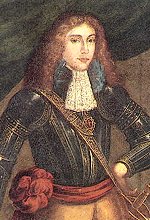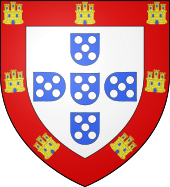Alfonso VI (Portugal)
Alfonso VI, Portuguese Dom Afonso VI, (* August 21, 1643 in Lisbon , † September 12, 1683 in Sintra ), called "the Victorious" (O Vitorioso), was the 22nd King of Portugal . He was the second monarch of the House of Braganza and ruled from 1656 until his death. He spent most of his reign as a prisoner of his brother Peter , whom he had appointed as regent in 1668.
Life
Alfonso VI was the third son of John IV of Portugal and his wife Luisa von Guzmán . When his father died in 1656 and Alfons came to the throne, he was only 13 years old. He was therefore initially under a reign led by his mother. Alfonso VI was paralyzed and mentally weak from the age of three, so that the reign was continued even after he came of age. Due to a conspiracy of the third Count of Castelo Melhor against the reign, Alfonso VI began. 1662 formally to govern independently, but the power fell de facto to the Count of Castelo Melhor, the gray eminence behind the throne.
John IV ascended the Portuguese throne in 1640 after an uprising that drove the Spanish Habsburgs , who had ruled Portugal in personal union since 1580 , from the country. The Spanish King Philip IV (who ruled Portugal as Philip III) had thus lost the Portuguese throne to the House of Braganza, but retained sovereignty over Spain. Spain was not ready to accept Portugal's defection without a fight. Since the country was involved in other wars (above all with France ) at the time of the uprising and therefore urgently needed its armies elsewhere, there was hardly any Spanish-Portuguese fighting during the reign of John IV.
In 1659 the war between Spain and France ended and the Spanish king now had the opportunity to turn to the Portuguese question. The Spaniards finally crossed the border with an army to defeat Alfonso VI. to drive out and restore the Habsburg rule over Portugal. In the course of this invasion, the Spanish troops occupied Elvas .
However, united Portuguese-British troops defeated the Spanish at Ameixial (June 8, 1663), Castelo Rodrigo (July 7, 1664) and Montes Claros (June 17, 1665).
In 1665 the Spanish King Philip IV died and with it the last monarch from the House of Habsburg who still had the Portuguese title of king. The Spaniards, weakened by their military defeats, had to recognize Portuguese independence in the Treaty of Lisbon in 1668 . Ceuta remained with Spain. These victories over Spain brought King Alfonso VI. the nickname "o vitorioso" (the victorious).
Despite these victories it became more and more obvious that Alfons VI. unable to govern the country efficiently because of his handicap. In 1666 he married Maria Franziska von Savoyen , Princess von Nemours. However, the queen fell in love with Alfons' younger brother Peter .
On November 23, 1667, Peter and the Queen drove out the previous Privy Council and forced the King to sign a document in which he waived the exercise of government. The king's marriage was dissolved because he was allegedly unable to consummate it. On March 24, 1668 the Queen married the Prince Regent Peter. The Cortes deposed the king in 1668 and appointed Peter regent. Alfonso VI initially lived as a prisoner on Terceira . After his followers tried to bring him back to the throne in 1673, he was imprisoned in a cell in the Palácio Nacional de Sintra until his death in 1683 . After his death, his brother ascended the Portuguese throne as King Peter II.
See also
Individual evidence
- ^ "Portugal (history until 1755)" . In: Meyers Konversations-Lexikon . 4th edition. Volume 13, Verlag des Bibliographisches Institut, Leipzig / Vienna 1885–1892, p. 256.
| predecessor | Office | successor |
|---|---|---|
| Johann IV. |
King of Portugal 1656–1683 |
Peter II |
| personal data | |
|---|---|
| SURNAME | Alfonso VI |
| ALTERNATIVE NAMES | King Alfonso VI the victorious |
| BRIEF DESCRIPTION | King of Portugal (1656-1683) |
| DATE OF BIRTH | August 21, 1643 |
| PLACE OF BIRTH | Lisbon |
| DATE OF DEATH | September 12, 1683 |
| Place of death | Lisbon |

